 ดูบน TensorFlow.org ดูบน TensorFlow.org |  ทำงานใน Google Colab ทำงานใน Google Colab |  ดูบน GitHub ดูบน GitHub |  ดาวน์โหลดโน๊ตบุ๊ค ดาวน์โหลดโน๊ตบุ๊ค |  ดูรุ่น TF Hub ดูรุ่น TF Hub |
colab นี้จะแสดงให้คุณเห็นถึงวิธีใช้โมเดล SPICE ที่ดาวน์โหลดจาก TensorFlow Hub
sudo apt-get install -q -y timidity libsndfile1
Reading package lists... Building dependency tree... Reading state information... The following packages were automatically installed and are no longer required: linux-gcp-5.4-headers-5.4.0-1040 linux-gcp-5.4-headers-5.4.0-1043 linux-gcp-5.4-headers-5.4.0-1044 linux-gcp-5.4-headers-5.4.0-1049 linux-headers-5.4.0-1049-gcp linux-image-5.4.0-1049-gcp linux-modules-5.4.0-1049-gcp linux-modules-extra-5.4.0-1049-gcp Use 'sudo apt autoremove' to remove them. The following additional packages will be installed: freepats libaudio2 libflac8 libjack-jackd2-0 libogg0 libsamplerate0 libvorbis0a libvorbisenc2 timidity-daemon Suggested packages: nas jackd2 fluid-soundfont-gm fluid-soundfont-gs pmidi The following NEW packages will be installed: freepats libaudio2 libflac8 libjack-jackd2-0 libogg0 libsamplerate0 libsndfile1 libvorbis0a libvorbisenc2 timidity timidity-daemon 0 upgraded, 11 newly installed, 0 to remove and 143 not upgraded. Need to get 31.4 MB of archives. After this operation, 40.4 MB of additional disk space will be used. Get:1 http://asia-east1.gce.archive.ubuntu.com/ubuntu bionic/main amd64 libogg0 amd64 1.3.2-1 [17.2 kB] Get:2 http://asia-east1.gce.archive.ubuntu.com/ubuntu bionic/universe amd64 freepats all 20060219-1 [29.0 MB] Get:3 http://asia-east1.gce.archive.ubuntu.com/ubuntu bionic/main amd64 libaudio2 amd64 1.9.4-6 [50.3 kB] Get:4 http://asia-east1.gce.archive.ubuntu.com/ubuntu bionic/main amd64 libflac8 amd64 1.3.2-1 [213 kB] Get:5 http://asia-east1.gce.archive.ubuntu.com/ubuntu bionic/main amd64 libsamplerate0 amd64 0.1.9-1 [938 kB] Get:6 http://asia-east1.gce.archive.ubuntu.com/ubuntu bionic/main amd64 libjack-jackd2-0 amd64 1.9.12~dfsg-2 [263 kB] Get:7 http://asia-east1.gce.archive.ubuntu.com/ubuntu bionic/main amd64 libvorbis0a amd64 1.3.5-4.2 [86.4 kB] Get:8 http://asia-east1.gce.archive.ubuntu.com/ubuntu bionic/main amd64 libvorbisenc2 amd64 1.3.5-4.2 [70.7 kB] Get:9 http://asia-east1.gce.archive.ubuntu.com/ubuntu bionic-updates/main amd64 libsndfile1 amd64 1.0.28-4ubuntu0.18.04.2 [170 kB] Get:10 http://asia-east1.gce.archive.ubuntu.com/ubuntu bionic/universe amd64 timidity amd64 2.13.2-41 [585 kB] Get:11 http://asia-east1.gce.archive.ubuntu.com/ubuntu bionic/universe amd64 timidity-daemon all 2.13.2-41 [5984 B] Fetched 31.4 MB in 2s (14.5 MB/s) Selecting previously unselected package libogg0:amd64. (Reading database ... 281949 files and directories currently installed.) Preparing to unpack .../00-libogg0_1.3.2-1_amd64.deb ... Unpacking libogg0:amd64 (1.3.2-1) ... Selecting previously unselected package freepats. Preparing to unpack .../01-freepats_20060219-1_all.deb ... Unpacking freepats (20060219-1) ... Selecting previously unselected package libaudio2:amd64. Preparing to unpack .../02-libaudio2_1.9.4-6_amd64.deb ... Unpacking libaudio2:amd64 (1.9.4-6) ... Selecting previously unselected package libflac8:amd64. Preparing to unpack .../03-libflac8_1.3.2-1_amd64.deb ... Unpacking libflac8:amd64 (1.3.2-1) ... Selecting previously unselected package libsamplerate0:amd64. Preparing to unpack .../04-libsamplerate0_0.1.9-1_amd64.deb ... Unpacking libsamplerate0:amd64 (0.1.9-1) ... Selecting previously unselected package libjack-jackd2-0:amd64. Preparing to unpack .../05-libjack-jackd2-0_1.9.12~dfsg-2_amd64.deb ... Unpacking libjack-jackd2-0:amd64 (1.9.12~dfsg-2) ... Selecting previously unselected package libvorbis0a:amd64. Preparing to unpack .../06-libvorbis0a_1.3.5-4.2_amd64.deb ... Unpacking libvorbis0a:amd64 (1.3.5-4.2) ... Selecting previously unselected package libvorbisenc2:amd64. Preparing to unpack .../07-libvorbisenc2_1.3.5-4.2_amd64.deb ... Unpacking libvorbisenc2:amd64 (1.3.5-4.2) ... Selecting previously unselected package libsndfile1:amd64. Preparing to unpack .../08-libsndfile1_1.0.28-4ubuntu0.18.04.2_amd64.deb ... Unpacking libsndfile1:amd64 (1.0.28-4ubuntu0.18.04.2) ... Selecting previously unselected package timidity. Preparing to unpack .../09-timidity_2.13.2-41_amd64.deb ... Unpacking timidity (2.13.2-41) ... Selecting previously unselected package timidity-daemon. Preparing to unpack .../10-timidity-daemon_2.13.2-41_all.deb ... Unpacking timidity-daemon (2.13.2-41) ... Setting up libogg0:amd64 (1.3.2-1) ... Setting up libsamplerate0:amd64 (0.1.9-1) ... Setting up freepats (20060219-1) ... Setting up libvorbis0a:amd64 (1.3.5-4.2) ... Setting up libaudio2:amd64 (1.9.4-6) ... Setting up libflac8:amd64 (1.3.2-1) ... Setting up libjack-jackd2-0:amd64 (1.9.12~dfsg-2) ... Setting up libvorbisenc2:amd64 (1.3.5-4.2) ... Setting up timidity (2.13.2-41) ... Setting up libsndfile1:amd64 (1.0.28-4ubuntu0.18.04.2) ... Setting up timidity-daemon (2.13.2-41) ... Adding group timidity....done Adding system user timidity....done Adding user `timidity' to group `audio' ... Adding user timidity to group audio Done. Processing triggers for man-db (2.8.3-2ubuntu0.1) ... Processing triggers for ureadahead (0.100.0-21) ... Processing triggers for libc-bin (2.27-3ubuntu1.2) ... Processing triggers for systemd (237-3ubuntu10.50) ...
# All the imports to deal with sound datapip install pydub numba==0.48 librosa music21
import tensorflow as tf
import tensorflow_hub as hub
import numpy as np
import matplotlib.pyplot as plt
import librosa
from librosa import display as librosadisplay
import logging
import math
import statistics
import sys
from IPython.display import Audio, Javascript
from scipy.io import wavfile
from base64 import b64decode
import music21
from pydub import AudioSegment
logger = logging.getLogger()
logger.setLevel(logging.ERROR)
print("tensorflow: %s" % tf.__version__)
#print("librosa: %s" % librosa.__version__)
/tmpfs/src/tf_docs_env/lib/python3.7/site-packages/numba/errors.py:137: UserWarning: Insufficiently recent colorama version found. Numba requires colorama >= 0.3.9
warnings.warn(msg)
tensorflow: 2.7.0
/tmpfs/src/tf_docs_env/lib/python3.7/site-packages/pydub/utils.py:170: RuntimeWarning: Couldn't find ffmpeg or avconv - defaulting to ffmpeg, but may not work
warn("Couldn't find ffmpeg or avconv - defaulting to ffmpeg, but may not work", RuntimeWarning)
ไฟล์อินพุตเสียง
ตอนนี้ส่วนที่ยากที่สุด: บันทึกการร้องเพลงของคุณ! :)
เรามีสี่วิธีในการรับไฟล์เสียง:
- บันทึกเสียงโดยตรงใน colab
- อัปโหลดจากคอมพิวเตอร์ของคุณ
- ใช้ไฟล์ที่บันทึกไว้ใน Google Drive
- ดาวน์โหลดไฟล์จากเว็บ
เลือกหนึ่งในสี่วิธีด้านล่าง
[เรียกใช้สิ่งนี้] คำจำกัดความของรหัส JS เพื่อบันทึกเสียงโดยตรงจากเบราว์เซอร์
RECORD = """
const sleep = time => new Promise(resolve => setTimeout(resolve, time))
const b2text = blob => new Promise(resolve => {
const reader = new FileReader()
reader.onloadend = e => resolve(e.srcElement.result)
reader.readAsDataURL(blob)
})
var record = time => new Promise(async resolve => {
stream = await navigator.mediaDevices.getUserMedia({ audio: true })
recorder = new MediaRecorder(stream)
chunks = []
recorder.ondataavailable = e => chunks.push(e.data)
recorder.start()
await sleep(time)
recorder.onstop = async ()=>{
blob = new Blob(chunks)
text = await b2text(blob)
resolve(text)
}
recorder.stop()
})
"""
def record(sec=5):
try:
from google.colab import output
except ImportError:
print('No possible to import output from google.colab')
return ''
else:
print('Recording')
display(Javascript(RECORD))
s = output.eval_js('record(%d)' % (sec*1000))
fname = 'recorded_audio.wav'
print('Saving to', fname)
b = b64decode(s.split(',')[1])
with open(fname, 'wb') as f:
f.write(b)
return fname
เลือกวิธีการป้อนข้อมูลเสียงของคุณ
INPUT_SOURCE = 'https://storage.googleapis.com/download.tensorflow.org/data/c-scale-metronome.wav'
print('You selected', INPUT_SOURCE)
if INPUT_SOURCE == 'RECORD':
uploaded_file_name = record(5)
elif INPUT_SOURCE == 'UPLOAD':
try:
from google.colab import files
except ImportError:
print("ImportError: files from google.colab seems to not be available")
else:
uploaded = files.upload()
for fn in uploaded.keys():
print('User uploaded file "{name}" with length {length} bytes'.format(
name=fn, length=len(uploaded[fn])))
uploaded_file_name = next(iter(uploaded))
print('Uploaded file: ' + uploaded_file_name)
elif INPUT_SOURCE.startswith('./drive/'):
try:
from google.colab import drive
except ImportError:
print("ImportError: files from google.colab seems to not be available")
else:
drive.mount('/content/drive')
# don't forget to change the name of the file you
# will you here!
gdrive_audio_file = 'YOUR_MUSIC_FILE.wav'
uploaded_file_name = INPUT_SOURCE
elif INPUT_SOURCE.startswith('http'):
!wget --no-check-certificate 'https://storage.googleapis.com/download.tensorflow.org/data/c-scale-metronome.wav' -O c-scale.wav
uploaded_file_name = 'c-scale.wav'
else:
print('Unrecognized input format!')
print('Please select "RECORD", "UPLOAD", or specify a file hosted on Google Drive or a file from the web to download file to download')
You selected https://storage.googleapis.com/download.tensorflow.org/data/c-scale-metronome.wav --2021-11-05 11:10:55-- https://storage.googleapis.com/download.tensorflow.org/data/c-scale-metronome.wav Resolving storage.googleapis.com (storage.googleapis.com)... 108.177.97.128, 64.233.189.128, 74.125.203.128, ... Connecting to storage.googleapis.com (storage.googleapis.com)|108.177.97.128|:443... connected. HTTP request sent, awaiting response... 200 OK Length: 384728 (376K) [audio/wav] Saving to: ‘c-scale.wav’ c-scale.wav 100%[===================>] 375.71K --.-KB/s in 0.006s 2021-11-05 11:10:56 (65.4 MB/s) - ‘c-scale.wav’ saved [384728/384728]
กำลังเตรียมข้อมูลเสียง
ตอนนี้เรามีไฟล์เสียงแล้ว มาแปลงเป็นฟอร์แมตที่ต้องการแล้วฟังกัน!
รุ่น SPICE ต้องการเป็นอินพุตไฟล์เสียงที่อัตราการสุ่มตัวอย่าง 16kHz และมีเพียงช่องเดียว (โมโน)
ที่จะช่วยให้คุณมีส่วนนี้เราได้สร้างฟังก์ชั่น ( convert_audio_for_model ) เพื่อแปลงไฟล์ wav ใด ๆ ที่คุณมีให้เป็นรูปแบบคาดว่ารูปแบบของ:
# Function that converts the user-created audio to the format that the model
# expects: bitrate 16kHz and only one channel (mono).
EXPECTED_SAMPLE_RATE = 16000
def convert_audio_for_model(user_file, output_file='converted_audio_file.wav'):
audio = AudioSegment.from_file(user_file)
audio = audio.set_frame_rate(EXPECTED_SAMPLE_RATE).set_channels(1)
audio.export(output_file, format="wav")
return output_file
# Converting to the expected format for the model
# in all the input 4 input method before, the uploaded file name is at
# the variable uploaded_file_name
converted_audio_file = convert_audio_for_model(uploaded_file_name)
# Loading audio samples from the wav file:
sample_rate, audio_samples = wavfile.read(converted_audio_file, 'rb')
# Show some basic information about the audio.
duration = len(audio_samples)/sample_rate
print(f'Sample rate: {sample_rate} Hz')
print(f'Total duration: {duration:.2f}s')
print(f'Size of the input: {len(audio_samples)}')
# Let's listen to the wav file.
Audio(audio_samples, rate=sample_rate)
Sample rate: 16000 Hz Total duration: 11.89s Size of the input: 190316
อย่างแรก เรามาดูรูปคลื่นของการร้องเพลงของเรากันก่อน
# We can visualize the audio as a waveform.
_ = plt.plot(audio_samples)
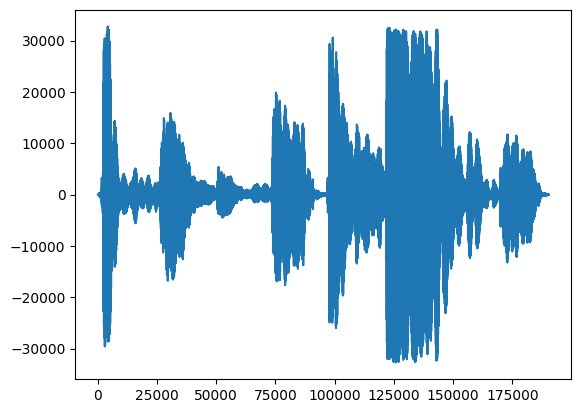
ภาพข้อมูลเพิ่มเติมข้อมูลเป็น spectrogram ซึ่งแสดงให้เห็นว่าความถี่นำเสนอในช่วงเวลา
ในที่นี้ เราใช้มาตราส่วนความถี่ลอการิทึม เพื่อให้มองเห็นการร้องเพลงได้ชัดเจนขึ้น
MAX_ABS_INT16 = 32768.0
def plot_stft(x, sample_rate, show_black_and_white=False):
x_stft = np.abs(librosa.stft(x, n_fft=2048))
fig, ax = plt.subplots()
fig.set_size_inches(20, 10)
x_stft_db = librosa.amplitude_to_db(x_stft, ref=np.max)
if(show_black_and_white):
librosadisplay.specshow(data=x_stft_db, y_axis='log',
sr=sample_rate, cmap='gray_r')
else:
librosadisplay.specshow(data=x_stft_db, y_axis='log', sr=sample_rate)
plt.colorbar(format='%+2.0f dB')
plot_stft(audio_samples / MAX_ABS_INT16 , sample_rate=EXPECTED_SAMPLE_RATE)
plt.show()
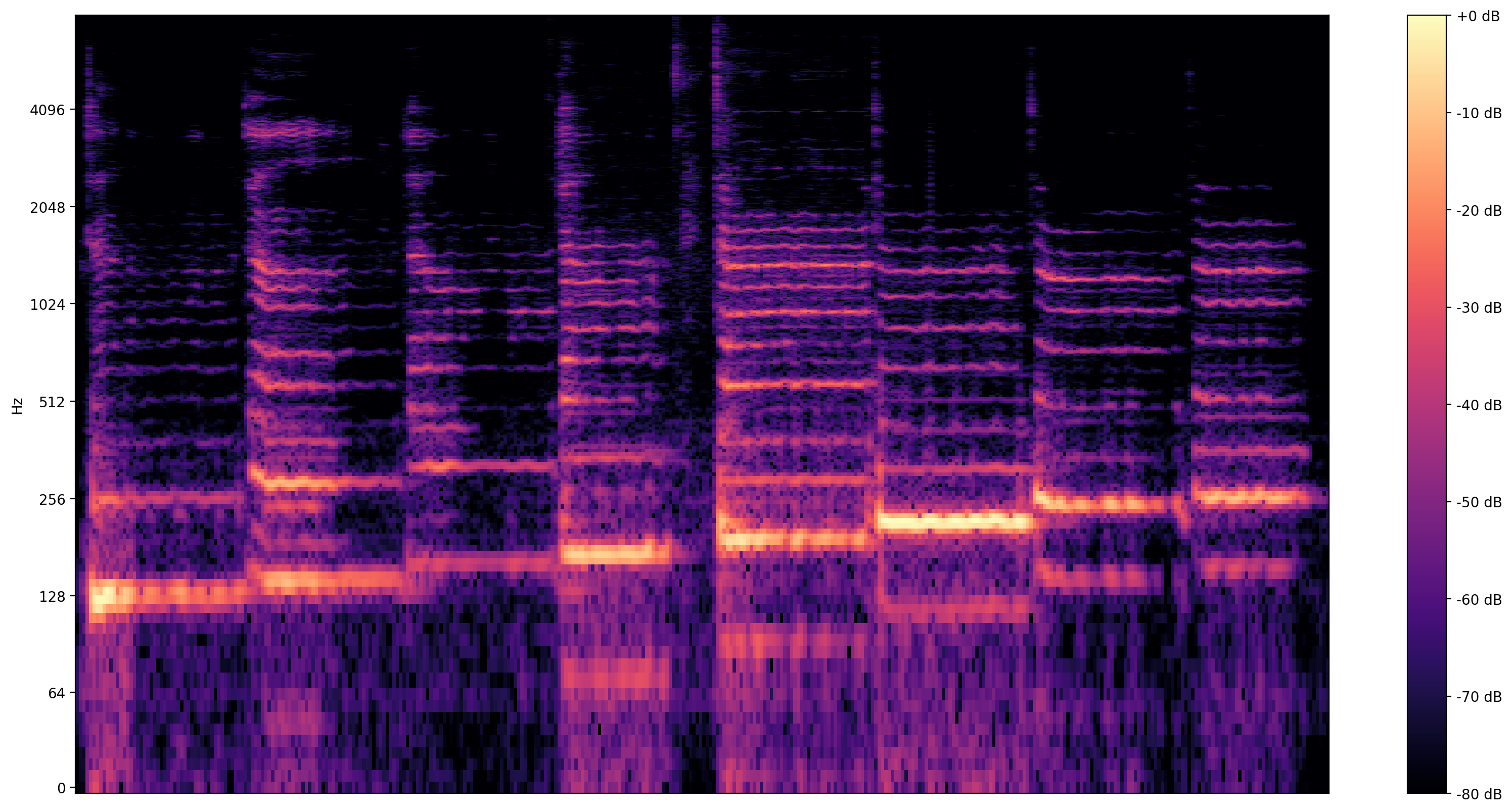
เราต้องการการแปลงครั้งสุดท้ายที่นี่ ตัวอย่างเสียงอยู่ในรูปแบบ int16 ต้องทำให้เป็นมาตรฐานเพื่อให้ลอยอยู่ระหว่าง -1 ถึง 1
audio_samples = audio_samples / float(MAX_ABS_INT16)
กำลังดำเนินการโมเดล
ตอนนี้เป็นส่วนที่ง่ายขอโหลดรูปแบบที่มี TensorFlow Hub และอาหารเสียงกับมัน SPICE จะให้ผลลัพธ์สองประการแก่เรา: ระดับเสียงและความไม่แน่นอน
TensorFlow Hub เป็นห้องสมุดสำหรับการตีพิมพ์การค้นพบและการบริโภคของชิ้นส่วนที่นำมาใช้ใหม่ของโมเดลการเรียนรู้ ทำให้ง่ายต่อการใช้แมชชีนเลิร์นนิงเพื่อแก้ปัญหาของคุณ
ในการโหลดโมเดล คุณเพียงแค่ต้องมีโมดูล Hub และ URL ที่ชี้ไปที่โมเดล:
# Loading the SPICE model is easy:
model = hub.load("https://tfhub.dev/google/spice/2")
WARNING:tensorflow:Unable to create a python object for variable <tf.Variable 'global_step:0' shape=() dtype=int64_ref> because it is a reference variable. It may not be visible to training APIs. If this is a problem, consider rebuilding the SavedModel after running tf.compat.v1.enable_resource_variables(). WARNING:tensorflow:Unable to create a python object for variable <tf.Variable 'global_step:0' shape=() dtype=int64_ref> because it is a reference variable. It may not be visible to training APIs. If this is a problem, consider rebuilding the SavedModel after running tf.compat.v1.enable_resource_variables(). WARNING:tensorflow:Unable to create a python object for variable <tf.Variable 'encoder/conv2d/kernel:0' shape=(1, 3, 1, 64) dtype=float32_ref> because it is a reference variable. It may not be visible to training APIs. If this is a problem, consider rebuilding the SavedModel after running tf.compat.v1.enable_resource_variables(). WARNING:tensorflow:Unable to create a python object for variable <tf.Variable 'encoder/conv2d/kernel:0' shape=(1, 3, 1, 64) dtype=float32_ref> because it is a reference variable. It may not be visible to training APIs. If this is a problem, consider rebuilding the SavedModel after running tf.compat.v1.enable_resource_variables(). WARNING:tensorflow:Unable to create a python object for variable <tf.Variable 'encoder/batch_normalization/gamma:0' shape=(64,) dtype=float32_ref> because it is a reference variable. It may not be visible to training APIs. If this is a problem, consider rebuilding the SavedModel after running tf.compat.v1.enable_resource_variables(). WARNING:tensorflow:Unable to create a python object for variable <tf.Variable 'encoder/batch_normalization/gamma:0' shape=(64,) dtype=float32_ref> because it is a reference variable. It may not be visible to training APIs. If this is a problem, consider rebuilding the SavedModel after running tf.compat.v1.enable_resource_variables(). WARNING:tensorflow:Unable to create a python object for variable <tf.Variable 'encoder/batch_normalization/beta:0' shape=(64,) dtype=float32_ref> because it is a reference variable. It may not be visible to training APIs. If this is a problem, consider rebuilding the SavedModel after running tf.compat.v1.enable_resource_variables(). WARNING:tensorflow:Unable to create a python object for variable <tf.Variable 'encoder/batch_normalization/beta:0' shape=(64,) dtype=float32_ref> because it is a reference variable. It may not be visible to training APIs. If this is a problem, consider rebuilding the SavedModel after running tf.compat.v1.enable_resource_variables(). WARNING:tensorflow:Unable to create a python object for variable <tf.Variable 'encoder/batch_normalization/moving_mean:0' shape=(64,) dtype=float32_ref> because it is a reference variable. It may not be visible to training APIs. If this is a problem, consider rebuilding the SavedModel after running tf.compat.v1.enable_resource_variables(). WARNING:tensorflow:Unable to create a python object for variable <tf.Variable 'encoder/batch_normalization/moving_mean:0' shape=(64,) dtype=float32_ref> because it is a reference variable. It may not be visible to training APIs. If this is a problem, consider rebuilding the SavedModel after running tf.compat.v1.enable_resource_variables(). WARNING:tensorflow:Unable to create a python object for variable <tf.Variable 'global_step:0' shape=() dtype=int64_ref> because it is a reference variable. It may not be visible to training APIs. If this is a problem, consider rebuilding the SavedModel after running tf.compat.v1.enable_resource_variables(). WARNING:tensorflow:Unable to create a python object for variable <tf.Variable 'global_step:0' shape=() dtype=int64_ref> because it is a reference variable. It may not be visible to training APIs. If this is a problem, consider rebuilding the SavedModel after running tf.compat.v1.enable_resource_variables(). WARNING:tensorflow:Unable to create a python object for variable <tf.Variable 'encoder/conv2d/kernel:0' shape=(1, 3, 1, 64) dtype=float32_ref> because it is a reference variable. It may not be visible to training APIs. If this is a problem, consider rebuilding the SavedModel after running tf.compat.v1.enable_resource_variables(). WARNING:tensorflow:Unable to create a python object for variable <tf.Variable 'encoder/conv2d/kernel:0' shape=(1, 3, 1, 64) dtype=float32_ref> because it is a reference variable. It may not be visible to training APIs. If this is a problem, consider rebuilding the SavedModel after running tf.compat.v1.enable_resource_variables(). WARNING:tensorflow:Unable to create a python object for variable <tf.Variable 'encoder/batch_normalization/gamma:0' shape=(64,) dtype=float32_ref> because it is a reference variable. It may not be visible to training APIs. If this is a problem, consider rebuilding the SavedModel after running tf.compat.v1.enable_resource_variables(). WARNING:tensorflow:Unable to create a python object for variable <tf.Variable 'encoder/batch_normalization/gamma:0' shape=(64,) dtype=float32_ref> because it is a reference variable. It may not be visible to training APIs. If this is a problem, consider rebuilding the SavedModel after running tf.compat.v1.enable_resource_variables(). WARNING:tensorflow:Unable to create a python object for variable <tf.Variable 'encoder/batch_normalization/beta:0' shape=(64,) dtype=float32_ref> because it is a reference variable. It may not be visible to training APIs. If this is a problem, consider rebuilding the SavedModel after running tf.compat.v1.enable_resource_variables(). WARNING:tensorflow:Unable to create a python object for variable <tf.Variable 'encoder/batch_normalization/beta:0' shape=(64,) dtype=float32_ref> because it is a reference variable. It may not be visible to training APIs. If this is a problem, consider rebuilding the SavedModel after running tf.compat.v1.enable_resource_variables(). WARNING:tensorflow:Unable to create a python object for variable <tf.Variable 'encoder/batch_normalization/moving_mean:0' shape=(64,) dtype=float32_ref> because it is a reference variable. It may not be visible to training APIs. If this is a problem, consider rebuilding the SavedModel after running tf.compat.v1.enable_resource_variables(). WARNING:tensorflow:Unable to create a python object for variable <tf.Variable 'encoder/batch_normalization/moving_mean:0' shape=(64,) dtype=float32_ref> because it is a reference variable. It may not be visible to training APIs. If this is a problem, consider rebuilding the SavedModel after running tf.compat.v1.enable_resource_variables(). WARNING:tensorflow:Unable to create a python object for variable <tf.Variable 'global_step:0' shape=() dtype=int64_ref> because it is a reference variable. It may not be visible to training APIs. If this is a problem, consider rebuilding the SavedModel after running tf.compat.v1.enable_resource_variables(). WARNING:tensorflow:Unable to create a python object for variable <tf.Variable 'global_step:0' shape=() dtype=int64_ref> because it is a reference variable. It may not be visible to training APIs. If this is a problem, consider rebuilding the SavedModel after running tf.compat.v1.enable_resource_variables(). WARNING:tensorflow:Unable to create a python object for variable <tf.Variable 'encoder/conv2d/kernel:0' shape=(1, 3, 1, 64) dtype=float32_ref> because it is a reference variable. It may not be visible to training APIs. If this is a problem, consider rebuilding the SavedModel after running tf.compat.v1.enable_resource_variables(). WARNING:tensorflow:Unable to create a python object for variable <tf.Variable 'encoder/conv2d/kernel:0' shape=(1, 3, 1, 64) dtype=float32_ref> because it is a reference variable. It may not be visible to training APIs. If this is a problem, consider rebuilding the SavedModel after running tf.compat.v1.enable_resource_variables(). WARNING:tensorflow:Unable to create a python object for variable <tf.Variable 'encoder/batch_normalization/gamma:0' shape=(64,) dtype=float32_ref> because it is a reference variable. It may not be visible to training APIs. If this is a problem, consider rebuilding the SavedModel after running tf.compat.v1.enable_resource_variables(). WARNING:tensorflow:Unable to create a python object for variable <tf.Variable 'encoder/batch_normalization/gamma:0' shape=(64,) dtype=float32_ref> because it is a reference variable. It may not be visible to training APIs. If this is a problem, consider rebuilding the SavedModel after running tf.compat.v1.enable_resource_variables(). WARNING:tensorflow:Unable to create a python object for variable <tf.Variable 'encoder/batch_normalization/beta:0' shape=(64,) dtype=float32_ref> because it is a reference variable. It may not be visible to training APIs. If this is a problem, consider rebuilding the SavedModel after running tf.compat.v1.enable_resource_variables(). WARNING:tensorflow:Unable to create a python object for variable <tf.Variable 'encoder/batch_normalization/beta:0' shape=(64,) dtype=float32_ref> because it is a reference variable. It may not be visible to training APIs. If this is a problem, consider rebuilding the SavedModel after running tf.compat.v1.enable_resource_variables(). WARNING:tensorflow:Unable to create a python object for variable <tf.Variable 'encoder/batch_normalization/moving_mean:0' shape=(64,) dtype=float32_ref> because it is a reference variable. It may not be visible to training APIs. If this is a problem, consider rebuilding the SavedModel after running tf.compat.v1.enable_resource_variables(). WARNING:tensorflow:Unable to create a python object for variable <tf.Variable 'encoder/batch_normalization/moving_mean:0' shape=(64,) dtype=float32_ref> because it is a reference variable. It may not be visible to training APIs. If this is a problem, consider rebuilding the SavedModel after running tf.compat.v1.enable_resource_variables(). WARNING:tensorflow:Unable to create a python object for variable <tf.Variable 'global_step:0' shape=() dtype=int64_ref> because it is a reference variable. It may not be visible to training APIs. If this is a problem, consider rebuilding the SavedModel after running tf.compat.v1.enable_resource_variables(). WARNING:tensorflow:Unable to create a python object for variable <tf.Variable 'global_step:0' shape=() dtype=int64_ref> because it is a reference variable. It may not be visible to training APIs. If this is a problem, consider rebuilding the SavedModel after running tf.compat.v1.enable_resource_variables(). WARNING:tensorflow:Unable to create a python object for variable <tf.Variable 'encoder/conv2d/kernel:0' shape=(1, 3, 1, 64) dtype=float32_ref> because it is a reference variable. It may not be visible to training APIs. If this is a problem, consider rebuilding the SavedModel after running tf.compat.v1.enable_resource_variables(). WARNING:tensorflow:Unable to create a python object for variable <tf.Variable 'encoder/conv2d/kernel:0' shape=(1, 3, 1, 64) dtype=float32_ref> because it is a reference variable. It may not be visible to training APIs. If this is a problem, consider rebuilding the SavedModel after running tf.compat.v1.enable_resource_variables(). WARNING:tensorflow:Unable to create a python object for variable <tf.Variable 'encoder/batch_normalization/gamma:0' shape=(64,) dtype=float32_ref> because it is a reference variable. It may not be visible to training APIs. If this is a problem, consider rebuilding the SavedModel after running tf.compat.v1.enable_resource_variables(). WARNING:tensorflow:Unable to create a python object for variable <tf.Variable 'encoder/batch_normalization/gamma:0' shape=(64,) dtype=float32_ref> because it is a reference variable. It may not be visible to training APIs. If this is a problem, consider rebuilding the SavedModel after running tf.compat.v1.enable_resource_variables(). WARNING:tensorflow:Unable to create a python object for variable <tf.Variable 'encoder/batch_normalization/beta:0' shape=(64,) dtype=float32_ref> because it is a reference variable. It may not be visible to training APIs. If this is a problem, consider rebuilding the SavedModel after running tf.compat.v1.enable_resource_variables(). WARNING:tensorflow:Unable to create a python object for variable <tf.Variable 'encoder/batch_normalization/beta:0' shape=(64,) dtype=float32_ref> because it is a reference variable. It may not be visible to training APIs. If this is a problem, consider rebuilding the SavedModel after running tf.compat.v1.enable_resource_variables(). WARNING:tensorflow:Unable to create a python object for variable <tf.Variable 'encoder/batch_normalization/moving_mean:0' shape=(64,) dtype=float32_ref> because it is a reference variable. It may not be visible to training APIs. If this is a problem, consider rebuilding the SavedModel after running tf.compat.v1.enable_resource_variables(). WARNING:tensorflow:Unable to create a python object for variable <tf.Variable 'encoder/batch_normalization/moving_mean:0' shape=(64,) dtype=float32_ref> because it is a reference variable. It may not be visible to training APIs. If this is a problem, consider rebuilding the SavedModel after running tf.compat.v1.enable_resource_variables().
เมื่อโหลดโมเดลและเตรียมข้อมูล เราต้องการ 3 บรรทัดเพื่อให้ได้ผลลัพธ์:
# We now feed the audio to the SPICE tf.hub model to obtain pitch and uncertainty outputs as tensors.
model_output = model.signatures["serving_default"](tf.constant(audio_samples, tf.float32))
pitch_outputs = model_output["pitch"]
uncertainty_outputs = model_output["uncertainty"]
# 'Uncertainty' basically means the inverse of confidence.
confidence_outputs = 1.0 - uncertainty_outputs
fig, ax = plt.subplots()
fig.set_size_inches(20, 10)
plt.plot(pitch_outputs, label='pitch')
plt.plot(confidence_outputs, label='confidence')
plt.legend(loc="lower right")
plt.show()
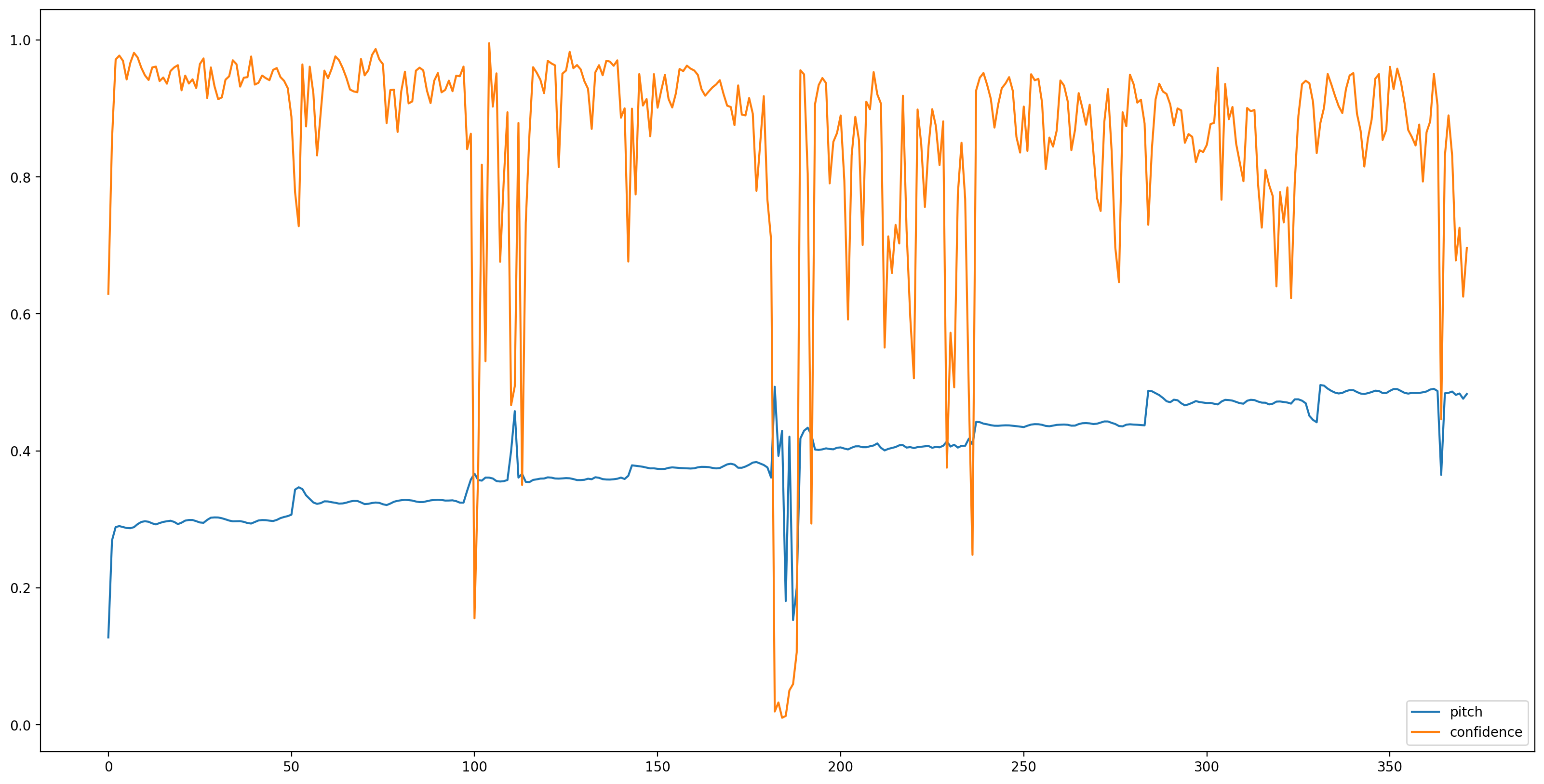
มาทำให้ผลลัพธ์ที่เข้าใจง่ายขึ้นโดยลบการประมาณการระดับเสียงทั้งหมดด้วยความมั่นใจต่ำ (ความมั่นใจ < 0.9) และพล็อตค่าที่เหลือ
confidence_outputs = list(confidence_outputs)
pitch_outputs = [ float(x) for x in pitch_outputs]
indices = range(len (pitch_outputs))
confident_pitch_outputs = [ (i,p)
for i, p, c in zip(indices, pitch_outputs, confidence_outputs) if c >= 0.9 ]
confident_pitch_outputs_x, confident_pitch_outputs_y = zip(*confident_pitch_outputs)
fig, ax = plt.subplots()
fig.set_size_inches(20, 10)
ax.set_ylim([0, 1])
plt.scatter(confident_pitch_outputs_x, confident_pitch_outputs_y, )
plt.scatter(confident_pitch_outputs_x, confident_pitch_outputs_y, c="r")
plt.show()
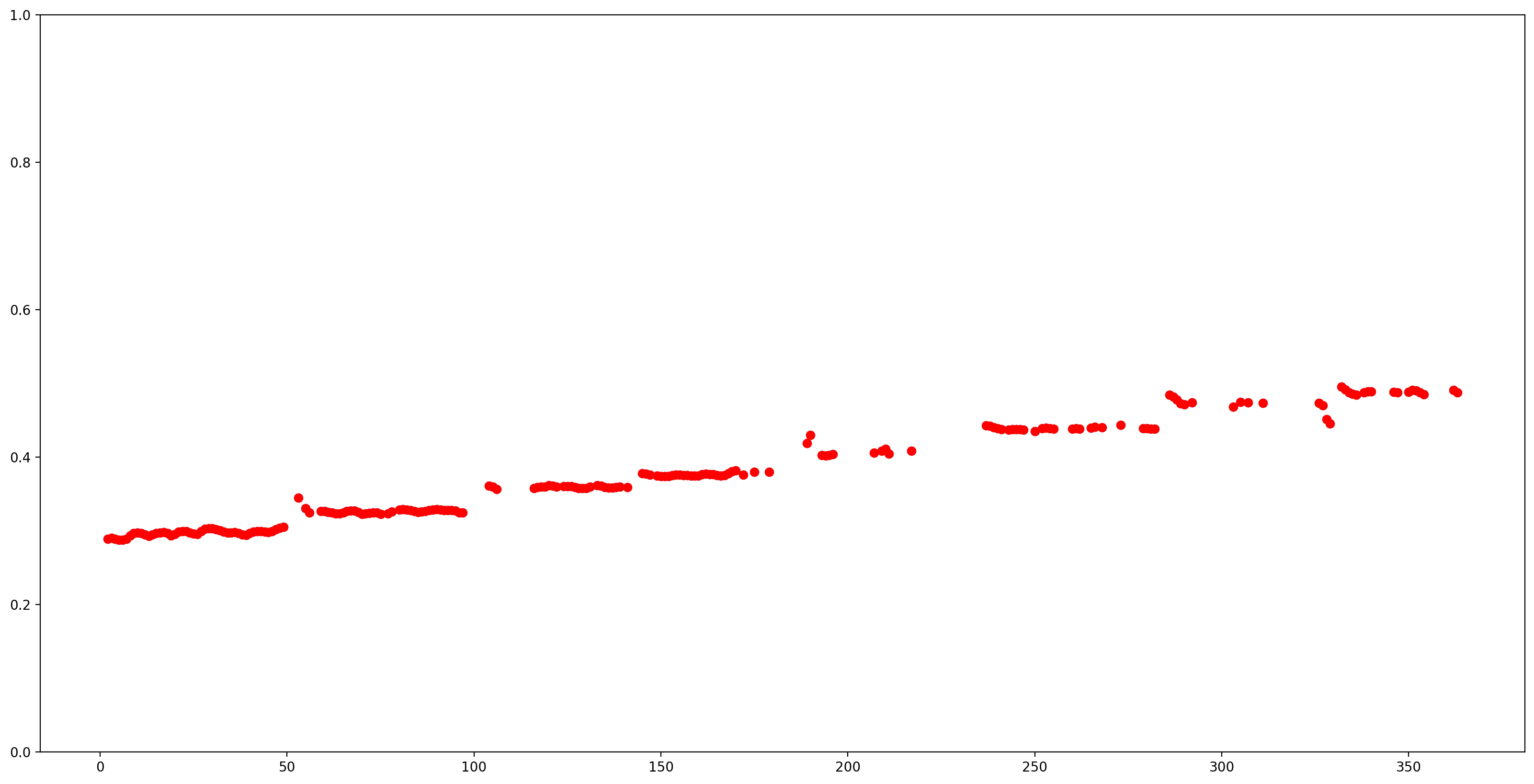
ค่าพิทช์ที่ส่งคืนโดย SPICE อยู่ในช่วงตั้งแต่ 0 ถึง 1 มาแปลงเป็นค่าพิทช์แบบสัมบูรณ์ในหน่วย Hz
def output2hz(pitch_output):
# Constants taken from https://tfhub.dev/google/spice/2
PT_OFFSET = 25.58
PT_SLOPE = 63.07
FMIN = 10.0;
BINS_PER_OCTAVE = 12.0;
cqt_bin = pitch_output * PT_SLOPE + PT_OFFSET;
return FMIN * 2.0 ** (1.0 * cqt_bin / BINS_PER_OCTAVE)
confident_pitch_values_hz = [ output2hz(p) for p in confident_pitch_outputs_y ]
ตอนนี้เรามาดูกันว่าการทำนายนั้นดีแค่ไหน: เราจะวางซ้อนสนามที่คาดการณ์ไว้เหนือสเปกโตรแกรมดั้งเดิม เพื่อให้การคาดคะเนระดับเสียงชัดเจนขึ้น เราจึงเปลี่ยนสเปกโตรแกรมเป็นขาวดำ
plot_stft(audio_samples / MAX_ABS_INT16 ,
sample_rate=EXPECTED_SAMPLE_RATE, show_black_and_white=True)
# Note: conveniently, since the plot is in log scale, the pitch outputs
# also get converted to the log scale automatically by matplotlib.
plt.scatter(confident_pitch_outputs_x, confident_pitch_values_hz, c="r")
plt.show()
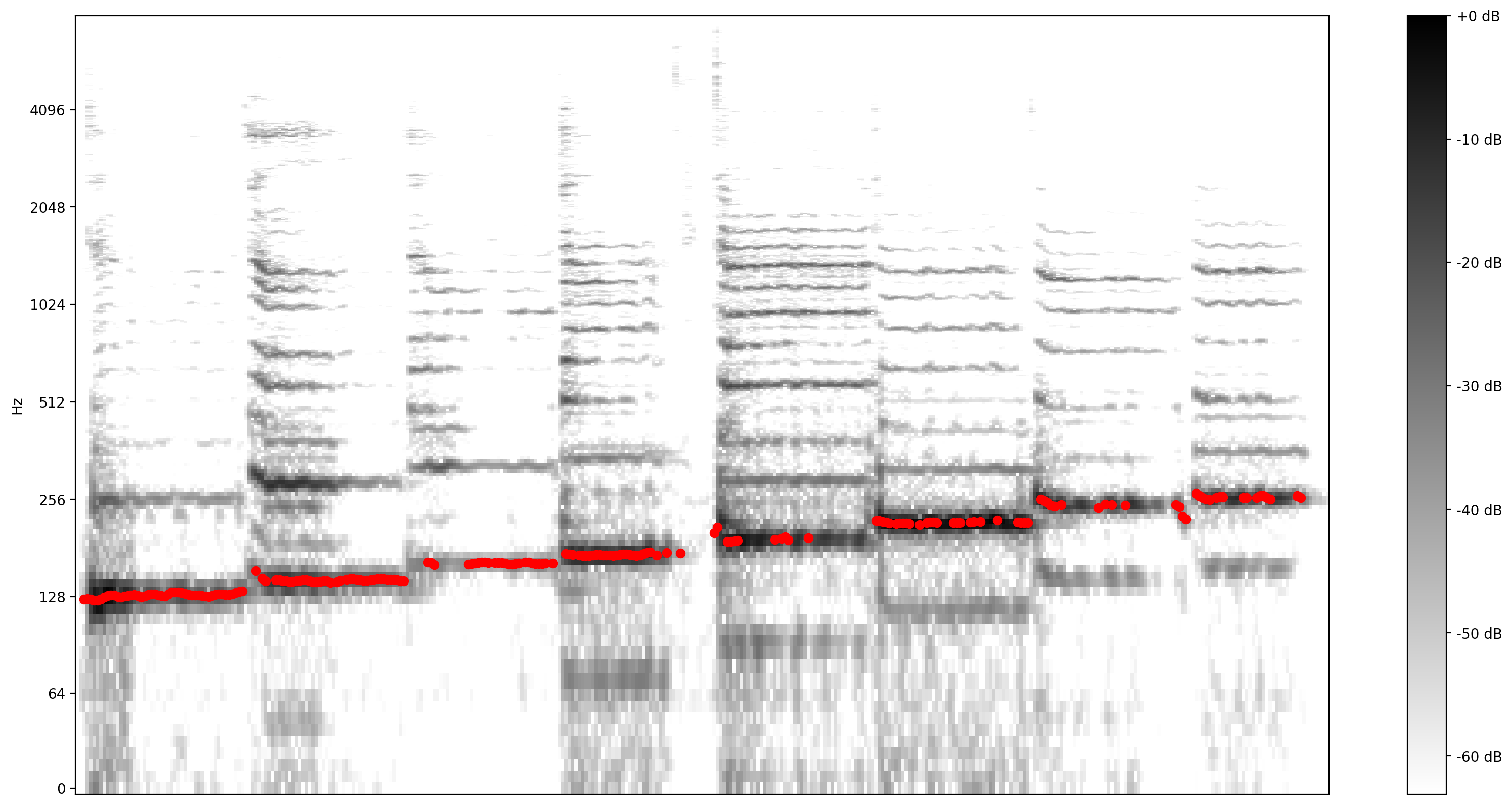
แปลงร่างเป็นโน้ตดนตรี
ตอนนี้เรามีค่าพิทช์แล้ว มาแปลงเป็นโน้ตกันเถอะ! นี่เป็นส่วนหนึ่งที่ท้าทายด้วยตัวมันเอง เราต้องคำนึงถึงสองสิ่ง:
- ส่วนที่เหลือ (เมื่อไม่มีการร้องเพลง)
- ขนาดของแต่ละโน้ต (ออฟเซ็ต)
1: การเพิ่มศูนย์ลงในเอาต์พุตเพื่อระบุเมื่อไม่มีการร้องเพลง
pitch_outputs_and_rests = [
output2hz(p) if c >= 0.9 else 0
for i, p, c in zip(indices, pitch_outputs, confidence_outputs)
]
2: การเพิ่มการชดเชยบันทึก
เมื่อบุคคลร้องเพลงได้อย่างอิสระ ทำนองเพลงอาจมีการชดเชยกับค่าระดับเสียงสัมบูรณ์ที่โน้ตสามารถแสดงได้ ดังนั้น ในการแปลงการคาดคะเนเป็นโน้ต เราจำเป็นต้องแก้ไขการชดเชยที่เป็นไปได้นี้ นี่คือสิ่งที่รหัสต่อไปนี้คำนวณ
A4 = 440
C0 = A4 * pow(2, -4.75)
note_names = ["C", "C#", "D", "D#", "E", "F", "F#", "G", "G#", "A", "A#", "B"]
def hz2offset(freq):
# This measures the quantization error for a single note.
if freq == 0: # Rests always have zero error.
return None
# Quantized note.
h = round(12 * math.log2(freq / C0))
return 12 * math.log2(freq / C0) - h
# The ideal offset is the mean quantization error for all the notes
# (excluding rests):
offsets = [hz2offset(p) for p in pitch_outputs_and_rests if p != 0]
print("offsets: ", offsets)
ideal_offset = statistics.mean(offsets)
print("ideal offset: ", ideal_offset)
offsets: [0.2851075707500712, 0.3700368844097355, 0.2861639241998972, 0.19609005646164235, 0.17851737247163868, 0.27334483073408933, -0.4475316266590852, -0.24651997073237908, -0.1796558047706398, -0.23060136331860548, -0.3782634107643901, -0.4725100625926686, -0.3457194541269999, -0.2436666886383776, -0.1818906877810207, -0.1348077739650435, -0.24551812662426897, -0.4454903457934165, -0.3126792745167535, -0.12241723670307181, -0.06614479972665066, -0.06702634735648871, -0.1744135098034576, -0.29365551425759406, -0.32520890458170726, -0.056438377636119696, 0.1470525135224534, 0.17167006002122775, 0.16529246704037348, 0.09569531546290477, -0.006323616641203955, -0.11799822075907684, -0.18835098459069144, -0.17934754504506145, -0.17215419157092526, -0.23695828034226452, -0.34594501002376177, -0.39380045278613807, -0.2528674895936689, -0.11009248657768467, -0.07118597401920113, -0.08042248799149121, -0.12799598588293293, -0.16227484329287023, -0.05931985421721464, 0.10667800800259641, 0.21044687793906292, 0.2931939382975841, -0.22329278631751492, -0.12365553720538003, -0.4571117360765271, -0.34864566459005175, -0.35947798653189267, -0.4313175396496476, -0.4818928106004421, 0.44220950977261, 0.45883109973128455, -0.47095522924010425, -0.3674495078498552, -0.3047186536962201, -0.31075979246441676, -0.4501382996017185, 0.3966096259778311, 0.4238116671269694, 0.4982676686471237, -0.45932030423227843, -0.4890504510576079, 0.3836871527260044, 0.4441304941600137, -0.38787359430138935, -0.24855899466817277, -0.20666386647764057, -0.23811575664822726, -0.2760223047310504, -0.3641714288169524, -0.41670903606955534, -0.41009272976462086, -0.3340427999073796, -0.26122959716860805, -0.2232610212141708, -0.19940660549943345, -0.22528914465252825, -0.2780899004513415, -0.2744434134537457, -0.25654931231085953, -0.33068201704567457, -0.4678933079416083, -0.4695135511333177, -0.1648153518015647, -0.24618840082233362, -0.48052406086269883, -0.3771743489677135, -0.32261801643912236, -0.25560347987954657, -0.24629741950576545, -0.14035005553309787, -0.16659160448853783, -0.2442749349648139, -0.236978201704666, -0.20882506652418442, -0.22637331529204374, -0.29836135937516417, -0.39081484182421633, -0.3909877680117404, -0.3650093676025108, -0.2642347521955202, -0.13023199393098395, -0.18214744283501716, -0.3020867909366345, -0.33754229827467697, -0.34391801162306024, -0.31454499496763333, -0.26713502510135356, -0.2910439501578139, -0.11686573876684037, -0.1673094354445226, -0.24345334692542053, -0.30852998240535356, -0.35647376789395935, -0.37154654069487236, -0.3600149954730796, -0.2667062802488047, -0.21902000440899627, -0.2484456507736752, -0.2774107871825038, -0.2941432754570741, -0.31118778272216474, -0.32662896348779213, -0.3053947554403962, -0.2160201109821145, -0.17343703730647775, -0.17792559965198507, -0.19880643679444177, -0.2725068260604502, -0.3152120758468442, -0.28217377586905457, -0.11595223738495974, 0.0541902144377957, 0.11488166735824024, -0.2559698195630773, 0.01930235610660702, -0.002236352401425279, 0.4468796487277231, 0.15514959977323883, 0.4207694853966899, 0.3854474319642236, 0.4373497234409598, -0.4694994504625001, -0.3662719146782649, -0.20354085369650932, -0.015043790774988963, -0.4185651697093675, -0.17896653874461066, -0.032896162706066434, -0.061098168330843805, -0.1953772325689087, -0.2545198683315988, -0.3363741032654488, -0.39191536320988973, -0.36531668408458984, -0.3489657612020167, -0.35455202891175475, -0.38925192399566555, 0.48781635300571935, -0.2820884378129733, -0.241939488189864, -0.24987341685836384, -0.3034880535179809, -0.2910712014014081, -0.2783103765422581, -0.30017802073304267, -0.23735882385318519, -0.15802705569807785, -0.1688725350672513, 0.00533368216211727, -0.2545762573057857, -0.28210347487274845, -0.29791870250051034, -0.3228369901949648, -0.3895802937323367, 0.4323827980583488, 0.17439196334535723, -0.12961039467398905, -0.2236296109730489, -0.04022635205333813, -0.4264043621594098, -0.0019025255615048309, -0.07466309859101727, -0.08665327413623203, -0.08169104440753472, -0.31617519541327965, -0.47420548422877573, 0.1502044753855003, 0.30507923857624064, 0.031032583278971515, -0.17852388186996393, -0.3371347884709195, -0.41780861421172233, -0.2023933346444835, -0.10604901297633518, -0.10771248771493447, -0.16037790997569346, -0.18698410763089868, -0.17355977250879562, -0.008242337244190878, -0.011401999431292609, -0.1876701734835322, -0.3601715640598968, 0.011681766969516616, -0.1931417836124183] ideal offset: -0.16889341450193418
ตอนนี้เราสามารถใช้การวิเคราะห์พฤติกรรมเพื่อลองประเมินลำดับของโน้ตที่ร้องได้มากที่สุด ค่าออฟเซ็ตในอุดมคติที่คำนวณไว้ด้านบนเป็นส่วนประกอบหนึ่ง แต่เราต้องรู้ความเร็วด้วย (มีการคาดการณ์กี่ครั้ง พูดได้ เป็นแปด) และการชดเชยเวลาเพื่อเริ่มการหาปริมาณ เพื่อให้ง่าย เราจะลองใช้ความเร็วและการชดเชยเวลาที่แตกต่างกัน และวัดข้อผิดพลาดในการวัดปริมาณ โดยใช้ค่าที่ลดข้อผิดพลาดนี้ให้เหลือน้อยที่สุด
def quantize_predictions(group, ideal_offset):
# Group values are either 0, or a pitch in Hz.
non_zero_values = [v for v in group if v != 0]
zero_values_count = len(group) - len(non_zero_values)
# Create a rest if 80% is silent, otherwise create a note.
if zero_values_count > 0.8 * len(group):
# Interpret as a rest. Count each dropped note as an error, weighted a bit
# worse than a badly sung note (which would 'cost' 0.5).
return 0.51 * len(non_zero_values), "Rest"
else:
# Interpret as note, estimating as mean of non-rest predictions.
h = round(
statistics.mean([
12 * math.log2(freq / C0) - ideal_offset for freq in non_zero_values
]))
octave = h // 12
n = h % 12
note = note_names[n] + str(octave)
# Quantization error is the total difference from the quantized note.
error = sum([
abs(12 * math.log2(freq / C0) - ideal_offset - h)
for freq in non_zero_values
])
return error, note
def get_quantization_and_error(pitch_outputs_and_rests, predictions_per_eighth,
prediction_start_offset, ideal_offset):
# Apply the start offset - we can just add the offset as rests.
pitch_outputs_and_rests = [0] * prediction_start_offset + \
pitch_outputs_and_rests
# Collect the predictions for each note (or rest).
groups = [
pitch_outputs_and_rests[i:i + predictions_per_eighth]
for i in range(0, len(pitch_outputs_and_rests), predictions_per_eighth)
]
quantization_error = 0
notes_and_rests = []
for group in groups:
error, note_or_rest = quantize_predictions(group, ideal_offset)
quantization_error += error
notes_and_rests.append(note_or_rest)
return quantization_error, notes_and_rests
best_error = float("inf")
best_notes_and_rests = None
best_predictions_per_note = None
for predictions_per_note in range(20, 65, 1):
for prediction_start_offset in range(predictions_per_note):
error, notes_and_rests = get_quantization_and_error(
pitch_outputs_and_rests, predictions_per_note,
prediction_start_offset, ideal_offset)
if error < best_error:
best_error = error
best_notes_and_rests = notes_and_rests
best_predictions_per_note = predictions_per_note
# At this point, best_notes_and_rests contains the best quantization.
# Since we don't need to have rests at the beginning, let's remove these:
while best_notes_and_rests[0] == 'Rest':
best_notes_and_rests = best_notes_and_rests[1:]
# Also remove silence at the end.
while best_notes_and_rests[-1] == 'Rest':
best_notes_and_rests = best_notes_and_rests[:-1]
ทีนี้มาเขียนโน้ตเชิงปริมาณเป็นโน้ตเพลงกันเถอะ!
ที่จะทำมันเราจะใช้สองห้องสมุด: music21 และ เปิดแผ่นเพลงการแสดงผล
# Creating the sheet music score.
sc = music21.stream.Score()
# Adjust the speed to match the actual singing.
bpm = 60 * 60 / best_predictions_per_note
print ('bpm: ', bpm)
a = music21.tempo.MetronomeMark(number=bpm)
sc.insert(0,a)
for snote in best_notes_and_rests:
d = 'half'
if snote == 'Rest':
sc.append(music21.note.Rest(type=d))
else:
sc.append(music21.note.Note(snote, type=d))
bpm: 78.26086956521739
[เรียกใช้] ฟังก์ชั่น Helper เพื่อใช้ Open Sheet Music Display (JS code) เพื่อแสดงโน้ตเพลง
from IPython.core.display import display, HTML, Javascript
import json, random
def showScore(score):
xml = open(score.write('musicxml')).read()
showMusicXML(xml)
def showMusicXML(xml):
DIV_ID = "OSMD_div"
display(HTML('<div id="'+DIV_ID+'">loading OpenSheetMusicDisplay</div>'))
script = """
var div_id = { {DIV_ID} };
function loadOSMD() {
return new Promise(function(resolve, reject){
if (window.opensheetmusicdisplay) {
return resolve(window.opensheetmusicdisplay)
}
// OSMD script has a 'define' call which conflicts with requirejs
var _define = window.define // save the define object
window.define = undefined // now the loaded script will ignore requirejs
var s = document.createElement( 'script' );
s.setAttribute( 'src', "https://cdn.jsdelivr.net/npm/opensheetmusicdisplay@0.7.6/build/opensheetmusicdisplay.min.js" );
//s.setAttribute( 'src', "/custom/opensheetmusicdisplay.js" );
s.onload=function(){
window.define = _define
resolve(opensheetmusicdisplay);
};
document.body.appendChild( s ); // browser will try to load the new script tag
})
}
loadOSMD().then((OSMD)=>{
window.openSheetMusicDisplay = new OSMD.OpenSheetMusicDisplay(div_id, {
drawingParameters: "compacttight"
});
openSheetMusicDisplay
.load({ {data} })
.then(
function() {
openSheetMusicDisplay.render();
}
);
})
""".replace('{ {DIV_ID} }',DIV_ID).replace('{ {data} }',json.dumps(xml))
display(Javascript(script))
return
# rendering the music score
showScore(sc)
print(best_notes_and_rests)
/tmpfs/src/tf_docs_env/lib/python3.7/site-packages/music21/musicxml/m21ToXml.py:465: MusicXMLWarning: <music21.stream.Score 0x7f276c652190> is not well-formed; see isWellFormedNotation() category=MusicXMLWarning)
<IPython.core.display.Javascript object> ['C3', 'D3', 'E3', 'F3', 'G3', 'A3', 'B3', 'C4']
มาแปลงโน้ตเพลงเป็นไฟล์ MIDI แล้วฟังกัน
ในการสร้างไฟล์นี้ เราสามารถใช้สตรีมที่เราสร้างไว้ก่อนหน้านี้ได้
# Saving the recognized musical notes as a MIDI file
converted_audio_file_as_midi = converted_audio_file[:-4] + '.mid'
fp = sc.write('midi', fp=converted_audio_file_as_midi)
wav_from_created_midi = converted_audio_file_as_midi.replace(' ', '_') + "_midioutput.wav"
print(wav_from_created_midi)
converted_audio_file.mid_midioutput.wav
หากต้องการฟังบน colab เราจำเป็นต้องแปลงกลับเป็น wav วิธีง่ายๆ ในการทำคือใช้ Timidity
timidity $converted_audio_file_as_midi -Ow -o $wav_from_created_midi
Playing converted_audio_file.mid MIDI file: converted_audio_file.mid Format: 1 Tracks: 2 Divisions: 1024 Track name: Playing time: ~16 seconds Notes cut: 0 Notes lost totally: 0
และสุดท้าย ฟังเสียงที่สร้างจากโน้ต สร้างผ่าน MIDI จากระดับเสียงที่คาดการณ์ อนุมานโดยโมเดล!
Audio(wav_from_created_midi)

